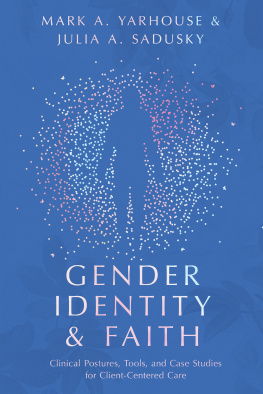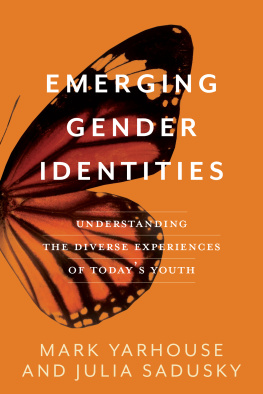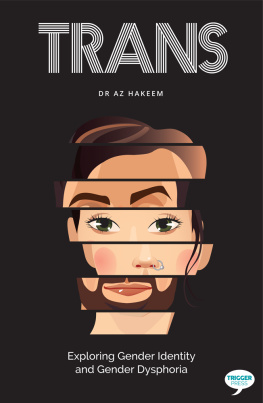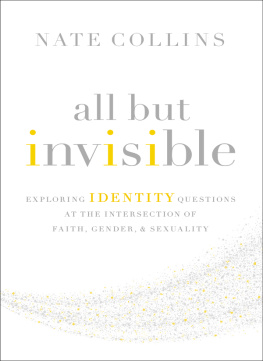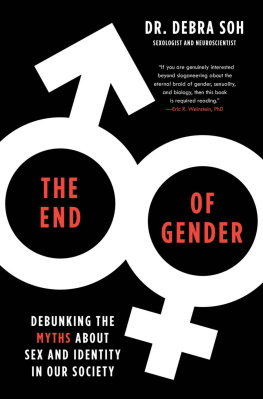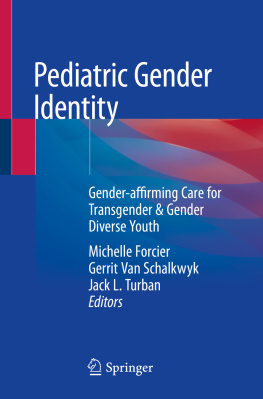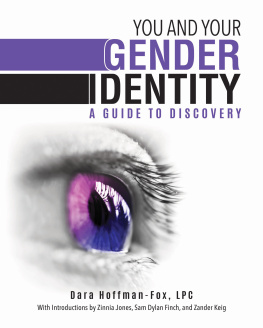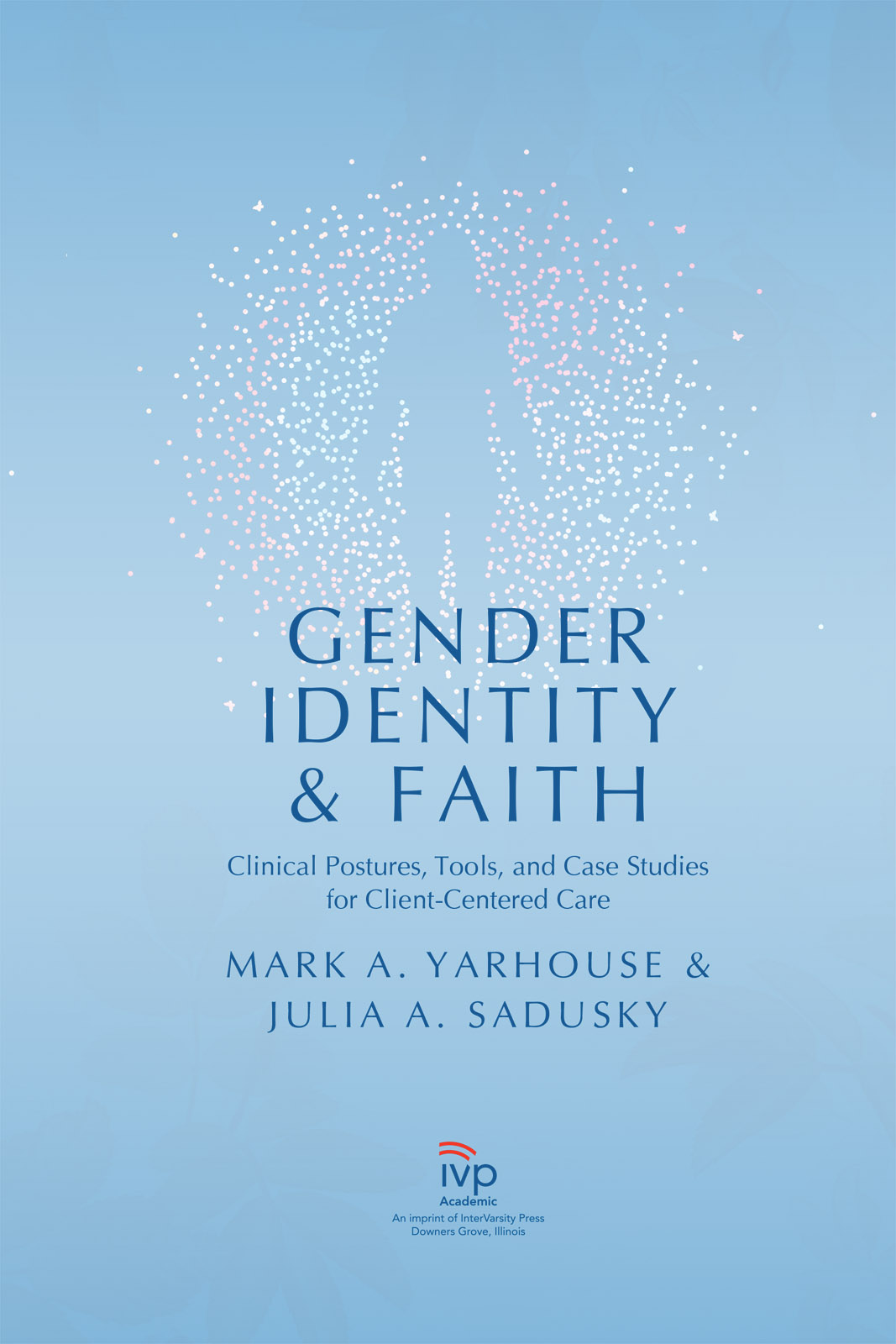Sommaire
Pagination de l'dition papier
Guide
InterVarsity Press
P.O. Box 1400, Downers Grove, IL 60515-1426
ivpress.com
email@ivpress.com
2022 by Mark A. Yarhouse and Julia Anne Sadusky
All rights reserved. No part of this book may be reproduced in any form without written permission from InterVarsity Press.
InterVarsity Press is the book-publishing division of InterVarsity Christian Fellowship/USA, a movement of students and faculty active on campus at hundreds of universities, colleges, and schools of nursing in the United States of America, and a member movement of the International Fellowship of Evangelical Students. For information about local and regional activities, visit intervarsity.org.
All Scripture quotations, unless otherwise indicated, are taken from The Holy Bible, New International Version, NIV. Copyright 1973, 1978, 1984, 2011 by Biblica, Inc. Used by permission of Zondervan. All rights reserved worldwide. www.zondervan.com. The NIV and New International Version are trademarks registered in the United States Patent and Trademark Office by Biblica, Inc.
While any stories in this book are true, some names and identifying information may have been changed to protect the privacy of individuals.
: scaffolding image: Didgeman / 2403 images / Pixabay
The publisher cannot verify the accuracy or functionality of website URLs used in this book beyond the date of publication.
Cover design and image composite: David Fassett
Images: Green leaves on white background: Eugene Golovesov / Pexels.com
Silhouette of a human: neoncat / iStock / Getty Images Plus
Abstract marble waves: oxygen / Moment / Getty Images
ISBN 978-0-8308-4182-0 (digital)
ISBN 978-0-8308-4181-3 (print)
This digital document has been produced by Nord Compo.
Preface
AS WE WROTE THIS BOOK, Arkansas became the first state to limit certain medical interventionspuberty blockers, hormone therapy, and gender-confirmation surgery (formerly called sex-reassignment surgery)for minors (Cox, 2021). Many lesbian, gay, bisexual, transgender, queer, and other (LGBTQ+) interest groups have actively opposed this legislation, framing it as anti-LGBTQ+ in its potential consequences for young people who are navigating gender identity or who represent a diverse gender identity.
According to a recent USA Today report, fifteen other states are considering similar legislation. The South Carolina bill under consideration, for example, would apply to any youth under age eighteen. This bill proposes to limit gender reassignment medical treatment, which it defines as the following health care interventions:
(a) interventions to suppress the development of endogenous secondary sex characteristics;
(b) interventions to align the patients appearance or physical body with the patients gender identity; and
(c) interventions to alleviate symptoms of clinically significant distress resulting from gender dysphoria, as defined in the Diagnostic and Statistical Manual of Mental Disorders, 5th Edition.
Depending on which version of the legislation is adopted, professional and legal consequences could ensue for medical professionals who provide these interventions to minors (Lamb, 2020). Consequences could include professional discipline, loss of ones license, fines, a charge of malpractice, and even a felony conviction. LGBTQ+ groups have responded by insisting that the medical coverage and care of transgender youth must be protected.
While legislation like that passed in Arkansas and comparable bills being considered in South Carolina are at odds with the efforts of LGBTQ+ groups, other recent public policy decisions reflect the impact of LGBTQ+ advocacy. Legislation limiting gender-identity-change efforts (GICE) has been passed in as many as nineteen states and will likely continue to be introduced in other states. For example, New Yorks legislation on sexual-orientation-change efforts (SOCE) also includes restrictions on efforts to change behaviors, gender identity, or gender expressions. New Yorks legislation also clarifies that the limits it places on SOCE shall not include counseling for a person seeking to transition from one gender to another.
Like the anti-medical-transition legislation adopted in Arkansas and proposed in South Carolina and other states, this anti-GICE legislation also includes professional and legal consequences for those who violate restrictions. However, these consequences threaten a very different group of medical practitioners.
We do not intend by this brief glimpse of the landscape to imply that these two sets of legislation are equivalent. The major mental health professional organizations in the United States have weighed in on these discussions and are against SOCE and GICE. They have also weighed in against efforts to limit access to medical services that would support and facilitate transition.
The reason we cite these divergent perspectives is to underscore that we are at a cultural moment in which the care provided to minors who are navigating questions around their gender identity is under great scrutiny, frequently polarized, and hotly contested. When legislation is introduced on either side of these debates, it may be well intended, but it can have a chilling effect on actual practice, limiting who is willing to work with people navigating gender-identity questions.
This book, then, is a timely resource for clinicians and others looking to gain awareness of the cultural, ideological, and political polarization surrounding care for young people navigating gender-identity questions. However, opinions and recommendations in this area are changing rapidly. We want to acknowledge that standards of care are subject to change over time, and no one book can possibly account for these possible changes in their totality. At the time of writing this, the World Professional Association for Transgender Health (WPATH) 2011 standards are in place, and these will inform our approach (Coleman et al., 2012). We recognize that changes in WPATH guidelines and updated research ought to lead to adjustments in conceptualization and treatment approaches. We are eager to learn alongside the field and will incorporate new information as it comes, knowing full well that we cannot fully predict and account for those updates here.
With that caveat in mind, the approach taken in this book reflects years of clinical experience that became more formalized after a special panel convened by the American Psychological Association (APA) to provide recommendations to the Substance Abuse and Mental Health Services Administration (SAMHSA) on SOCE and GICE with minors. One of the panels recommendations was to help youth explore their gender identity without a fixed outcome (SAMHSA, 2015). This proposal was meant to guard against two sets of concerns facing the consensus panel. In one direction, the panel wanted to caution against relying on gender stereotypes to discipline a child toward resolving gender conflicts with their natal sex. In the other direction, the panel was concerned about premature transitioning without sufficient gender-identity exploration or amelioration of coexisting mental health concerns.
Although many transgender-affirming resources are available today (and more will undoubtedly be made available in the years ahead), some of these approaches raise more questions than answers for conventionally religious families whose religious doctrines and values, including religious norms regarding sex and gender, inform their decision making.

